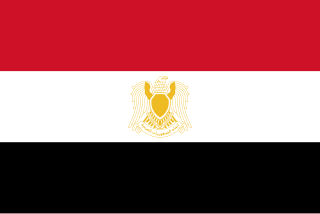
The Federation of Arab Republics was an unsuccessful attempt by Muammar Gaddafi to merge Libya, Egypt and Syria in order to create a unified Arab state. Although approved by a referendum in each country on 1 September 1971, the three countries disagreed on the specific terms of the merger. The federation lasted from 1 January 1972 to 19 November 1977.
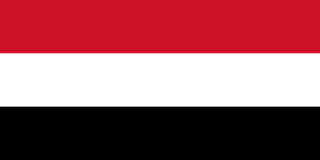
The Revolutionary Command Council was a twelve-member governing body that ruled the Libyan Arab Republic after the 1969 Libyan coup d'état by the Free Officers Movement, which overthrew the Senussi monarchy of King Idris I. The council's chairman was Muammar Gaddafi, who had the most influence and served as Libya's de facto head of state as Revolutionary Chairman of the Libyan Arab Republic and commander-in-chief of the armed forces. It was ideologically Arab nationalist, republican, anti-imperialist and pan-Arabist.
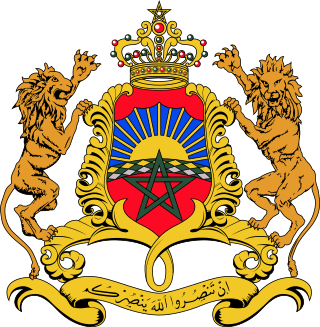
A referendum on the Arabic–African Federation Treaty was held in Morocco on 31 August 1984. The treaty would create a union of states between Morocco and Libya as part of a first step towards a "Great Arab Maghreb". It was approved by 99.98% of voters, with a 97% turnout.
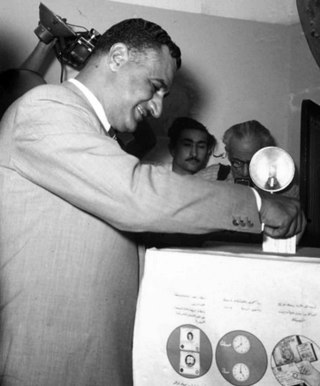
A double referendum was held in Egypt on 23 June 1956. The two issues were the candidacy of Gamal Abdel Nasser for the presidency and a new constitution. Both were approved, with the official figures showing 99.9% in favour of Nasser's candidacy and 99.8% in favour of the constitution.

A referendum on the creation of the United Arab Republic was held in Egypt on 21 February 1958, alongside a simultaneous referendum in Syria. The referendum consisted of two questions; one on the formation of the UAR, and the other on Gamal Abdel Nasser's candidacy for the post of President of the UAR. Both were approved, with fewer than 300 votes against and a 98.1% voter turnout.

Parliamentary elections were held in Egypt on 3 July 1957, having originally been scheduled for November 1956, but postponed due to the Suez Crisis. They were the first elections since the 1952 revolution, which saw King Farouk overthrown, the Republic of Egypt established and the approval of a new constitution in a June 1956 referendum.

A double referendum was held in Egypt on 19 April 1979. The two subjects were the Egypt–Israel peace treaty and changes to the country's political system, including the reintroduction of multi-party politics and the change to a bicameral Parliament through the creation of the Shura Council. The Peace Treaty was approved by 99.9% of voters, whilst the political reforms were approved by 99.7%. Voter turnout was 90.2%.

A constitutional referendum was held in Egypt on 22 May 1980. The amendments would create the Shura Council, an upper house for the country's Parliament, and were approved by 99% of voters.
Early parliamentary elections were held in Egypt on 6 April 1987, with a second round for nine seats on 13 April. They followed a change in the electoral law, approved by a referendum in February, which would allow independent candidates to run in the election. The result was a victory for the ruling National Democratic Party, which won 346 of the 458 seats. Following the election, the People's Assembly nominated incumbent Hosni Mubarak for the post of president, whose candidacy was put to voters in a referendum on 5 October.

Presidential elections were held in Egypt on 4 October 1993. The vote took the form of a referendum on the candidacy of Hosni Mubarak after he was nominated for the post by a 439–9 vote in the People's Assembly on 21 July. His candidacy for a third consecutive six-year term was approved by 96.3% of voters, with a turnout of 84.2%.
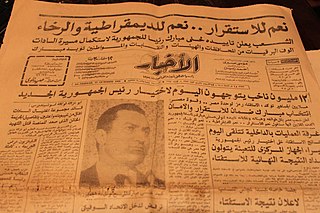
Presidential elections were held in Egypt on 13 October 1981 following the assassination of President Anwar Sadat on 6 October. House of Representatives speaker Sufi Abu Taleb became acting president until the new president was elected. The vote took the form of a referendum on the candidacy of vice president and interim prime minister Hosni Mubarak. According to the official results, 98% of voters voted in favour of Mubarak with voter turnout reported to be 81%.

Presidential elections were held in the United Arab Republic on 15 March 1965. The election took the form of a referendum on the candidacy of Gamal Abdel Nasser, who ran unopposed. He won with almost seven million votes, and only 65 against. Voter turnout was 98.5%.

A referendum on the 30 March Program was held in the United Arab Republic on 2 May 1968. It was approved by 100% of voters, with only 798 votes against. Voter turnout was 98.2%.

A referendum on the Federation of Arab Republics was held in Egypt on 1 September 1971, alongside simultaneous referendums in Libya and Syria. It was approved by 99.96% of voters, with a turnout of 98.1%.

A constitutional referendum was held in Egypt on 11 September 1971. The changes to the constitution were approved by 99.98% of voters, with a turnout of 95.1%.

A referendum on the October Paper was held in Egypt on 15 May 1974. It was approved by 99.9% of voters, with a turnout of 97.9%.

A referendum on "the protection of national unity" was held in Egypt on 10 February 1977. It was approved by 99.4% of voters, with a turnout of 96.7%.

A referendum on "the protection of national unity and social peace" was held in Egypt on 21 May 1978. It was approved by 98.3% of voters.

A referendum on "the protection of national unity" was held in Egypt on 10 September 1981. It was approved by 99.5% of voters.
Parliamentary elections were held in the United Arab Republic on 10 March 1964, with a second round on 19 March. At the time the country was a one-party state and all candidates had to be members of the Arab Socialist Union (ASU). A total of 1,750 candidates contested the 350 elected seats. A further ten members were appointed by President Gamal Abdel Nasser.









